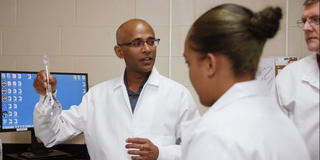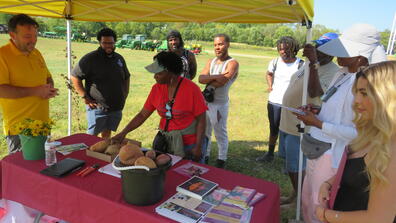
USDA invests $10 million for Central State University, partner organizations to launch ‘From the Ground Up’ climate smart agricultural practices

Above: Sakthi Kumaran, Ph.D., research associate professor of Soil Science and Agronomy in the Agricultural Research and Development Program at Central State University, works with students in a lab.
The United States Department of Agriculture has allocated a $10 million grant for Central State University and partner Land-Grant universities in Ohio and Missouri to accelerate the adoption of climate smart agricultural practices.

Led by The Ohio State University, the initiative will involve close collaborations with researchers, extension staff, and students at Central State, the University of Missouri, Lincoln University and Solutions from the Land. The transdisciplinary team aims to advance and co-create solutions to enhance the climate resilience of farmers in the Midwest.
While specialized crop and livestock production in the United States has significantly boosted efficiency and productivity, it has also led to declines in soil health and organic matter, challenges in water quality, loss of biodiversity, and increased susceptibility to extreme weather events. Climate smart agricultural practices (CSAPs) are emerging as potential solutions to reduce greenhouse gas emissions, enhance carbon sequestration, improve climate resilience and ensure farm viability. However, traditional top-down approaches to promoting adoption have been slow.
This project takes a novel approach by collaborating with farmers "From the Ground Up" to identify and overcome barriers, thereby accelerating the adoption of CSAPs on Midwest farms.
The project is funded through USDA’s flagship Sustainable Agricultural Systems program, with Central State’s Sakthi Kumaran, Ph.D., research associate professor of Soil Science and Agronomy in the Agricultural Research and Development Program, serving as the Institutional lead. The co-principle investigator (PI) is Denise Natoli-Brooks.
Central State will be involved in all aspects of the project over the next five years and will receive received approximately $1.67 million in grant funding. The initiative will involve working with dozens of Ohio and Missouri farmers. The investments in collaborate partnerships will provide new opportunities for underrepresented minority students to gain hands-on experience and career training in climate smart farming systems and collaborative transdisciplinary modes of agricultural research and education.
“This is an unprecedented investment by the USDA in a farmer-led response to address water quality and carbon sequestration challenges in agriculture,” said project lead Dr. Jackson-Smith of OSU. “We’ll be engaging farmers in Ohio and Missouri, major farm states with diverse biophysical contexts where the impacts of climate variability on CSAP performance can be compared across time and space. With this investment, we will spur innovation clusters where farmers themselves identify and overcome logistical, agronomic, and economic barriers that make it difficult for them to use conservation practices. We believe farmer leadership through collaborative on-farm research and peer-to-peer learning networks are key to finding realistic solutions that really work on the farm.”
A new Undergraduate Integrated Internship at Central State and Lincoln University, both HBCUs, will enable students to participate in summer work-based learning experiences connected to the project’s three tiers of research, engagement and extension activities. Central State will hire an educational coordinator to develop and manage a curriculum for K-12 students in their home schools while integrating it with existing programs on the Central State campus, including summer camps, Kumaran said.
“Beyond co-filling knowledge gaps in Climate Smart Agricultural Practices in partnership with the farmers, this project will foster strategic partnerships between 1862 and 1890 Land-Grant institutions in the Midwestern states,” Kumaran said.
“We will work together to jointly achieve the Land-Grant mission of these universities, including education of underrepresented students in STEM fields, preparing them to enter agricultural workforce as trained next generation leaders. We will advance the educational mission of our states by investing early in a students’ educational years.”
For more information about Central State University’s Land-Grant designation, visit https://www.centralstate.edu/about-csu/1890-land-grant-university.


